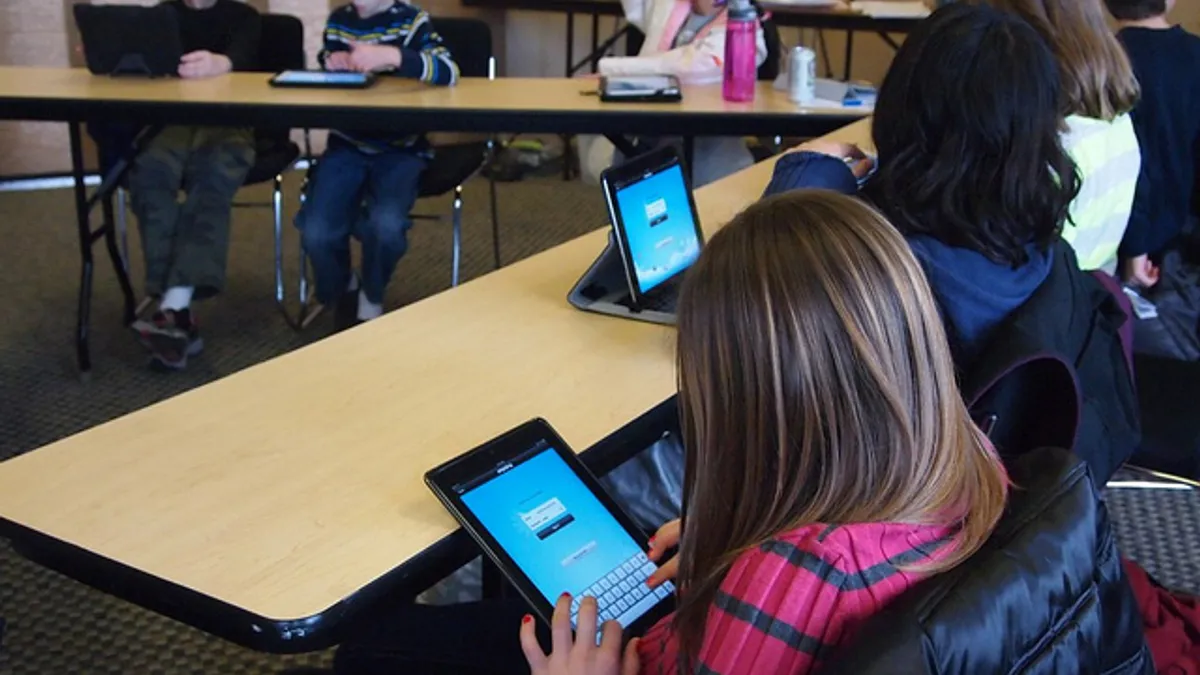Georgia and North Carolina will join Louisiana and New Hampshire as part of a U.S. Department of Education (ED) pilot program that allows states to use different assessment methods as an alternative to traditional standardized tests, ED announced Wednesday.
Part of the Every Student Succeeds Act, the Innovative Assessment Demonstration Authority (IADA) lifts some federal requirements related to testing as long as the model chosen is reliable and can produce a summative score or proficiency level. The results also have to be comparable across districts in a state.
"This pilot program gives states that are willing to try a new approach an opportunity to assess student achievement without sacrificing rigor or skirting accountability,” Secretary of Education Betsy DeVos said in a statement. “I look forward to seeing the impact this study will have on student outcomes."
IADA was influenced in part by New Hampshire’s Performance Assessment of Competency Education, a network of multiple districts using assessments that are designed by teachers and intended to be more connected to what students learn throughout the school year. Along with efforts to reduce the number of tests students take throughout their K-12 years, the pilot is one effort to correct for what many educators and experts considered was an era of over-testing under the previous No Child Left Behind Act.
"For the benefit of our students, we must all continue to rethink assessment in the state of Georgia," state Superintendent Richard Woods, said in a statement. "I will keep pursuing a change in state law to get state testing requirements in line with the federal minimum, along with a more realistic use of test scores for accountability purposes."
While the pilot allowed for up to seven states to participate, the four approved were the only ones that applied, which experts have said points to challenges of spreading innovative models across multiple districts and, if they are performance-based assessments, giving teachers sufficient time to design them.
“Some education analysts and assessment experts have expressed disappointment that more states did not pursue this opportunity,” said a report released last week by Bellwether Education Partners. “Others point to the technical constraints and requirements of the pilot, as well as the lack of additional federal funds associated directly with the waivers.”
Giving interim assessments during the year — so the results can be more useful to teachers — is another trend noted in the Bellwether report.
That’s the goal of the two new, technology-based approaches that the Georgia Department of Education will be implementing as part of its pilot program. In one model, students will take interim assessments — MAP Growth for Georgia, created by nonprofit assessment organization NWEA — that adapt to their responses.
ED also approved the state's Putnam Consortium, a group of 12 districts using "Navvy," a system of diagnostic tests designed to give teachers real-time assessment data focusing on state standards. Both methods are intended to help teachers adjust their instruction during the year to better respond to students’ needs.
The pilot adds to other ways the Georgia Department of Education has been using technology to implement new assessment methods. The state legislature is funding a series of game-based literacy and math assessments for 1st- and 2nd-graders viewed as a more appropriate way than paper-and-pencil tests to gather achievement data on young children.
North Carolina’s model is an end-of-year assessment called a "route" that is linked to a student’s performance on formative assessments, called “Check-Ins” they take during the school year, demonstrating again the desire schools have had to align assessments more closely with the work students do in the classroom.
Educators use data from the Check-Ins "to determine which 'route' or cluster of items students will take at the end of the school year on the final test," Tammy Howard, the director of accountability services for the North Carolina Department of Public Instruction, said in an email. "Using test items already taken to determine subsequent items to administer is an acceptable practice utilized on some assessments."
According to the Bellwether report, the state’s goals have been “reducing test time and increasing transparency for students, teachers, and families.”













